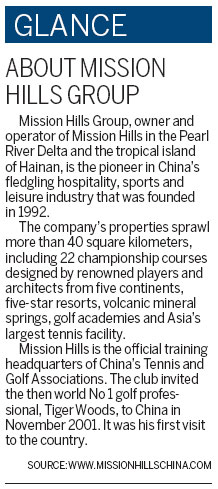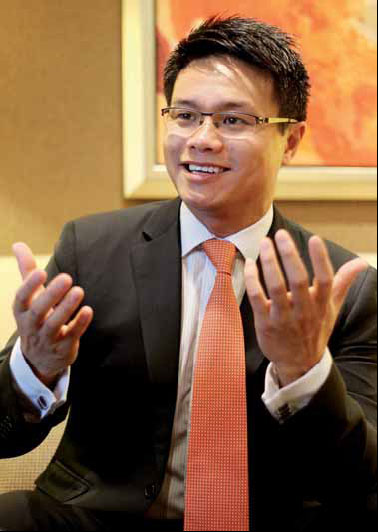Going for a big drive
Updated: 2012-05-25 09:04
By Zhao Huanxin (China Daily)
|
||||||||
|
Ken Chu, chairman and CEO of Mission Hills Group, is looking to grow its golf brand across China. Wang Jing / China Daily |

Close-knit family to grow Mission Hills golf brand across China
The son of a Chinese golf legend on the brink of writing his own legacy is finding a clever way to spread the sport and his company's success throughout China.
Ken Chu, chairman and CEO of Mission Hills Group, owner of the world's largest golf club with resorts in the cities of Shenzhen, Dongguan and Haikou, is also well aware of the national moratorium on building new courses. He's well aware that last June, 11 Chinese ministries collectively ordered a crackdown to prevent illegal land use and seizures.
But the 38-year-old is still pledging to expand his company, which currently has a staff of at least 15,000, to golf clubs in other parts of China - through the use of brand marketing.
"We are bringing our tried and true brand and golf management services to Beijing, Shanghai, Xi'an, Yunnan (province), Chongqing and other destinations," Chu says. "Just like hoteliers developing hotel chains, we'll spread the golf brand throughout China."
Since the group began its golf operations in 1994, it has evolved into a conglomerate of hotels and resorts, golf and country clubs, residential communities, sports academies and pro shops. The company has 12 courses in Shenzhen and Dongguan in Guangdong province, and another 10 on the island province of Hainan, all of which cover more than 40 square kilometers.
The Mission Hills Golf Club in Shenzhen and Dongguan is a 12-course resort regarded as the world's largest golf facility by the Guinness World Records in 2004, with courses designed by some of the biggest names in the sport, such as Jack Nicklaus, Greg Norman and Ernie Els.
The club has played host to more than 100 international tournaments, including the 1995 World Cup of Golf and the 2001 Tiger Woods China Challenge, both in Shenzhen.
Through a business model of offering sports, health services, five-star hotel resorts and exhibition spaces, the company is driving the industry at a time when the sport is on the cusp of a windfall. According to the China Golf Association, there are at least 3 million golfers in the nation and more than 500 courses, an astounding number considering there was no golf course until 1984.
Chu took over the reins of the Mission Hills Group after his father, David Chu, died in August.
David Chu is considered by many in the nation to be "the father of golf in China" for spearheading the game's rise to prominence, such as building the 12 golf courses in Guangdong in 1992. He had also lobbied for the sport to be included in the Summer Olympics and promoted the game's popularity in China until his death. In 2009, David Chu was named in Golf Inc magazine's list of the "most powerful people in golf".
"My father has made a lot of Chinese very proud and he has been at the forefront of developing golf. I want to carry on his legacy to make the sport more entertaining," Ken Chu says. "Now I want to prove to the world that he was a good father, too, by showing that he taught me well."
The Mission Hills CEO says he is trying to grow the company through a combination of health services, resorts and improving existing golf courses throughout China.
"We'll introduce (our business) model to clubs that carry the banner of Mission Hills," he says. "I can help existing golf courses that are not doing as well as they should, to reposition them, to remarket them and to make them profitable for the existing owners because Mission Hills has 20 years of experience in golf management."
Golf clubs deemed unfit for year-round operations, in northern China for instance, will not only be branded under the Missions Hills name but will have a contractual agreement to allow, or share, cross-national memberships. Members of a club in Beijing, for instance, would be able to use the Mission Hills club in Hainan. This move will also allow the company to absorb an unprofitable golf club's staff.
"We'll also bring international tournaments to cities and TV network distribution deals," he says.
The 10-course resort in Haikou is Chu's shining example of the company's business model. Not long after the government announced plans to turn Hainan province into a top tourist destination by 2020, the golf destination has become a fully equipped resort, with dozens of restaurants and a massive hot spring. He says his all-inclusive business helps drive local economies.
"If you have the ability to travel or to eat in a restaurant, you are actually providing a job for an operator," says Chu, who adds that Mission Hills Haikou employs about 3,000.
"I'm so proud to say the world's largest public golf facility is not in the United States, not in Europe, but in Hainan, China," Chu says. "There's no barrier to play golf. you don't need a membership here, and you can play for as little as 480 yuan ($73, 59 euros) per round."
He says the island resort is also environmentally friendly because it uses sustainable building materials.
One area the company is staying away from is securing a listing on the Hong Kong stock exchange, despite speculation to the contrary.
"Not all investors will agree with me in using their investments to develop a waste land, or a very raw area, but I know it can be done because we did it 20 years ago," Chu says.
Since the early 1990s, the group has been developing property and facilities on hills and patches of waste land away from city centers. Mission Hills Haikou, for example, was built on the city's 20 sq km of volcanic lava rock.
"Stock investors tend to look at short returns, quick returns, but all this investment is long-term," he says, adding that 5 billion yuan was budgeted for the Hainan resort. "So (investors) may not understand (what I'm doing or want to do), and I don't care about their skepticism. What I care about is how the local people and governments react - they must see value (from our investments)."
David Levy, director of China Golf magazine, says he thought it was smart of Mission Hills not to go public. "Once you get listed publicly, you come under a lot of scrutiny and some of that scrutiny is unfortunately beyond your ability to control," says Levy, a close friend of the Chu's family.
Levy says companies go public because they want to be able to build up a cash flow. When it comes to a family business such as Missions Hills that involves many family members, going public means everybody has their individual share holdings. The children of David Chu work very closely as a team, and most of them play a vital part in running the company.
"I think what is happening here is first of all, with the connections and with the growth they have shown, and with a lot of people that are prepared to support the company you don't need to go public in order to grow," Levy says.
zhaohuanxin@chinadaily.com.cn
(China Daily 05/25/2012 page17)

 Relief reaches isolated village
Relief reaches isolated village
 Rainfall poses new threats to quake-hit region
Rainfall poses new threats to quake-hit region
 Funerals begin for Boston bombing victims
Funerals begin for Boston bombing victims
 Quake takeaway from China's Air Force
Quake takeaway from China's Air Force
 Obama celebrates young inventors at science fair
Obama celebrates young inventors at science fair
 Earth Day marked around the world
Earth Day marked around the world
 Volunteer team helping students find sense of normalcy
Volunteer team helping students find sense of normalcy
 Ethnic groups quick to join rescue efforts
Ethnic groups quick to join rescue efforts
Most Viewed
Editor's Picks

|

|

|

|

|

|
Today's Top News
Chinese fleet drives out Japan's boats from Diaoyu
Health new priority for quake zone
Inspired by Guan, more Chinese pick up golf
Russia criticizes US reports on human rights
China, ROK criticize visits to shrine
Sino-US shared interests emphasized
China 'aims to share its dream with world'
Chinese president appoints 5 new ambassadors
US Weekly

|

|







